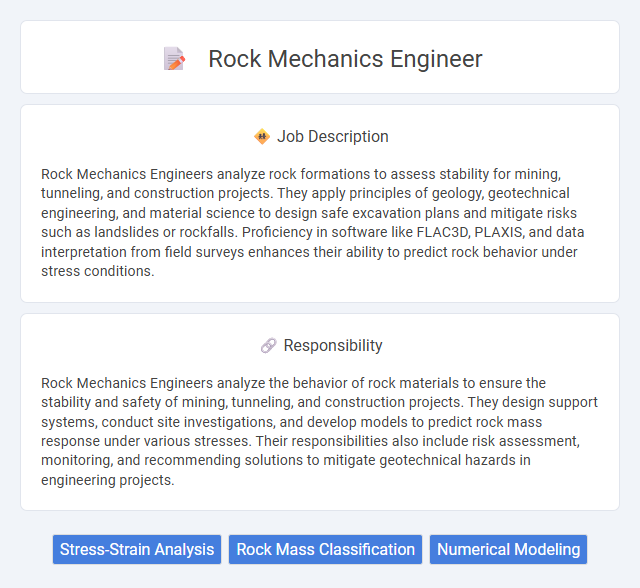
Rock Mechanics Engineers analyze rock formations to assess stability for mining, tunneling, and construction projects. They apply principles of geology, geotechnical engineering, and material science to design safe excavation plans and mitigate risks such as landslides or rockfalls. Proficiency in software like FLAC3D, PLAXIS, and data interpretation from field surveys enhances their ability to predict rock behavior under stress conditions.
Individuals with strong analytical skills and a passion for geology or civil engineering will likely find a career as a Rock Mechanics Engineer suitable. Those comfortable working in challenging environments and solving complex problems related to rock stability and safety may have higher chances of success. People who prefer hands-on technical work combined with field research might find this role particularly fitting.
Qualification
A Rock Mechanics Engineer requires a bachelor's degree in geology, civil engineering, or mining engineering, often complemented by a master's degree specializing in rock mechanics or geotechnical engineering. Proficiency in numerical modeling software such as FLAC, Phase2, or Rocscience is essential for analyzing rock behavior under various stress conditions. Strong knowledge of rock properties, structural geology, and field investigation techniques is crucial for designing safe excavation and support systems in mining, tunneling, or construction projects.
Responsibility
Rock Mechanics Engineers analyze the behavior of rock materials to ensure the stability and safety of mining, tunneling, and construction projects. They design support systems, conduct site investigations, and develop models to predict rock mass response under various stresses. Their responsibilities also include risk assessment, monitoring, and recommending solutions to mitigate geotechnical hazards in engineering projects.
Benefit
Rock Mechanics Engineers likely enjoy significant benefits such as competitive salaries and opportunities for career advancement in mining, civil engineering, and geotechnical sectors. Access to cutting-edge technology and involvement in innovative projects may enhance job satisfaction and professional growth. Work environments often include both fieldwork and office-based research, offering a balanced and dynamic career experience.
Challenge
Rock Mechanics Engineer positions likely involve complex problem-solving challenges related to the stability and safety of geological structures. The role probably requires managing unpredictable subsurface conditions and integrating geological data with engineering principles. One can expect frequent adaptations to evolving project demands and the need to develop innovative solutions for rock mass behavior analysis.
Career Advancement
Rock Mechanics Engineers specialize in analyzing rock behavior for safe and efficient construction in mining, civil engineering, and petroleum industries. Career advancement opportunities include progressing to senior engineer, project manager, or technical consultant roles, often requiring expertise in geotechnical software and risk assessment. Pursuing certifications such as Professional Engineering (PE) or specialized training in rock mechanics enhances employability and leadership potential within the sector.
Key Terms
Stress-Strain Analysis
Rock Mechanics Engineers specialize in stress-strain analysis to evaluate the deformation and stability of rock masses under various load conditions. They use advanced computational models and field data to predict rock behavior, ensuring the safety and integrity of tunnels, slopes, and foundations. Expertise in stress-strain relationships helps optimize excavation methods and mitigate potential geotechnical failures.
Rock Mass Classification
Rock Mechanics Engineers specialize in analyzing rock mass behavior to ensure stability in construction and mining projects. They utilize advanced Rock Mass Classification systems such as the Rock Mass Rating (RMR) and Q-system to evaluate rock quality, strength, and fracture characteristics. Accurate classification informs design decisions for tunnels, slopes, foundations, and excavation support, directly impacting project safety and efficiency.
Numerical Modeling
Rock Mechanics Engineers specialize in analyzing the mechanical behavior of rock masses using advanced numerical modeling techniques such as finite element analysis (FEA) and discrete element methods (DEM). These professionals develop simulations to predict rock stability, stress distribution, and deformation under various environmental and loading conditions, crucial for mining, tunneling, and civil engineering projects. Proficiency in software tools like FLAC3D, COMSOL Multiphysics, and Rocscience is essential to optimize design safety and mitigate geotechnical risks.
 kuljobs.com
kuljobs.com